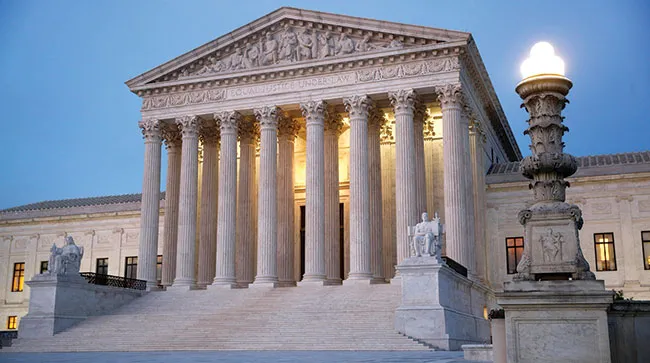Senior Reporter
Regulatory Victories Mark 2022, but New Challenges Lie Ahead

[Stay on top of transportation news: Get TTNews in your inbox.]
As the nation began easing its way out of the COVID-19 pandemic in 2022, activity on closely watched initiatives related to the trucking workforce heated up, while efforts to advance new laws for trucking fleets kept stakeholders engaged.
One of the year’s biggest industry wins came in September, when a federal judge struck down as unconstitutional a truck tolling plan by the Rhode Island Department of Transportation. The program was challenged in a lawsuit by American Trucking Associations on grounds that it unfairly enforced tolls specifically on motor carriers traveling through the state.
In another major industry win, the Occupational Safety and Health Administration announced in January formal withdrawal of its emergency temporary standard mandating large companies to require employees to receive COVID-19 vaccinations. The withdrawal was the direct result of a ATA legal challenge to the standard that made its way to the U.S. Supreme Court.
Motor carriers were also busy dealing with the fallout from California’s Assembly Bill 5, which was unsuccessfully challenged in court by the California Trucking Association. The law’s three-pronged, so-called ABC test requires motor carriers to classify their workers as employees unless they demonstrate that the worker is free from the control of the hiring entity; performs work outside the usual course of the hiring entity’s business; and is customarily engaged in an independent trade or occupation.
The association had argued that a legal test made it nearly impossible for carriers to use owner-operators and instead forced them to hire the drivers as employees.

Multiple cases relevant to the trucking industry came before the Supreme Court this year. (Patrick Semansky/Associated Press)
Also in that state, officials with the California Air Resources Board continued with plans to in 2024 begin transitioning away from heavy diesel trucks toward electric trucks. At an October hearing, truckers expressed concerns ranging from the cost of new electric trucks to the adequacy of charging infrastructure when California’s proposed Advanced Clean Fleets Regulation takes effect.
On the federal level, Congress confirmed a new FMCSA administrator, Robin Hutcheson. It was the first time in a while that a permanent head was confirmed to the post; most recent agency heads owned acting status in the role.
Transportation groups expressed general support for the U.S. Environmental Protection Agency proposed plan to set a national mandate for reducing nitrogen oxides emissions. However, in testimony at an EPA hearing in May, truckers cautioned against an overly aggressive approach that could be harmful to motor carriers’ operations and ability to serve the public.
In July, FMCSA began accepting applications from motor carriers interested in participating in the agency’s Safe Driver Apprenticeship Pilot Program for 18- to 20-year-old truck drivers to operate interstate. The pilot will allow a maximum of 1,000 carriers and 3,000 apprentice drivers to participate
Safety
On the safety front, DOT started the new year with a plan that called for actions to address what it called “a national crisis in roadway fatalities and serious injuries.” The plan illustrated how the agency continues to work toward reducing car and truck-involved fatalities on the nation’s highways. The DOT Inspector General has repeatedly reported that reducing fatalities and injuries remains a major management challenge for the agency.
In February, DOT proposed adding new drug testing guidelines that would permit motor carriers to test truck drivers using oral fluid samples as an alternative to urine testing. “This will give employers a choice that will help combat employee cheating on urine drug tests and provide a more economical, less intrusive means of achieving the safety goals of the program,” the agency said.
FMCSA also introduced several controversial regulatory proposals, including a formal statement of intent to develop a speed limiter rule and issuing an advance notice of proposed rulemaking aimed at requiring truckers to install electronic identifiers on their trucks to help law enforcement better scrutinize high-risk motor carriers.
The legalization of marijuana in several states and the post-pandemic economy have left the trucking industry with a bit of a perplexing mystery. Thousands of truck drivers who have lost their jobs after testing positive for marijuana have not enrolled in return-to-work programs that would permit them to climb back into the cab — a situation that could be exacerbating an already critical driver shortage.
In April, the Commercial Vehicle Safety Alliance petitioned federal trucking regulators to add a maximum time and/or mileage limit to clarify the definition of personal conveyance use by commercial truck drivers. CVSA complained that under the existing requirement it’s difficult for inspectors to verify legitimate personal conveyance time claimed by drivers.

Multiple regulatory questions about drug testing methods persisted in 2022. (dusanpetkovic/Getty Images)
At year’s end, it was still unclear when regulators at the U.S. Department of Health and Human Services would publish a final drug testing rule for truck drivers using hair samples. The agency continues to slog its way through the regulatory process, nearly six years after it was mandated by Congress and two years since it was first formally proposed.
Meanwhile, in December, a new FMCSA study concluded that harassment and assaults against truck drivers are widespread, particularly among women and minority male drivers, and underreported. The new study and survey were done by the Columbus, Ohio-based Battelle Memorial Institute, a private nonprofit applied science and technology development company.
By the end of the year, the number of scammers convicted in a massive staged accident scheme with heavy trucks in the New Orleans area had reached 42. The series of intentional accidents with trucks, dating back to 2015, has cost truckers millions of dollars in settlements with crooks who blamed truck drivers for the crashes. Federal investigators believe there have been up to 100 of the fake accidents so far.
Also, a provision tucked in the bipartisan infrastructure funding law calls for the formation of a truck leasing task force, officials said. The task force has been charged with examining the fairness of lease and lease-purchase agreements between motor carriers, leasing companies, owner-operators and drayage drivers.
Want more news? Listen to today's daily briefing below or go here for more info:


